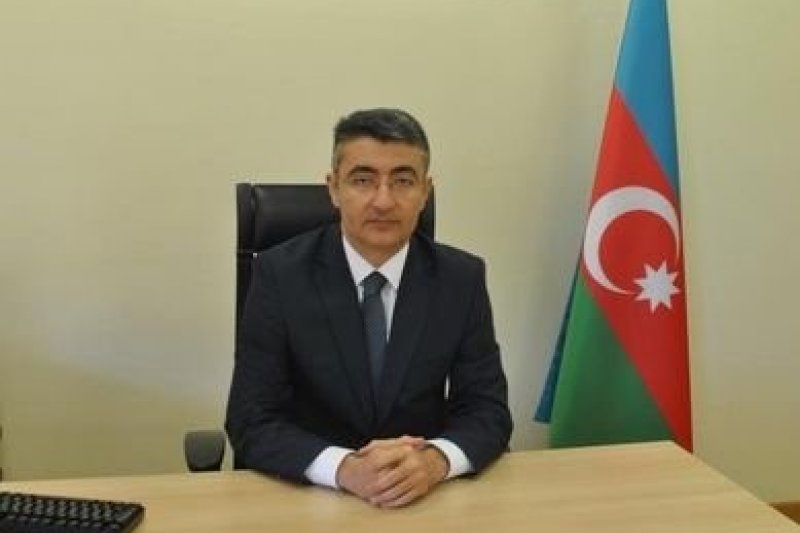EXCLUSIVE/ Ambassador of Azerbaijan: TAP, Only the Beginning
The Trans-Adriatic Pipeline, one of the most important energy projects that Albania has been lucky to be a part of, has undoubtedly given a central attention to the name of Azerbaijan with Albanian public discourse. Before that, the Caucasus country, rich of oil and natural gas, that became independent after the dissolution of the Soviet Union, was somewhat familiar to Albanians as a member of UN, OSCE, NATO’s Partnership for Peace, Council of Europe, Euro-Atlantic Partnership Council, EBRD etc. And even more so, because several Albanian football players made a respectful career in the country’s championship, our former national team captain Ansi Agolli included.
But apart from sports, Azerbaijan’s presence in Albania has enjoyed an increasing trend thanks to various investments, mainly in the energy field.
In December last year, Ambassador Anar Huseynov presented his credentials to Greek President Pavlopoulos, whereas the Azerbaijani top diplomat resident in Athens did the same in Tirana on Wednesday with President Meta, as the Ambassador of Azerbaijan to Albania.
We had the opportunity to have an interview with Mr. Huseynov, who expresses his confidence that beyond TAP, which has played a catalyst role and represents a first successful story of cooperation between our countries, both countries can explore potential for cooperation in other areas of mutual interest including tourism, agriculture, mutual investments, education, culture etc.
“For most of Azerbaijanis Albania as a country in Europe still remains undiscovered, despite its beautiful nature, friendly people and cooperation opportunities. As you mentioned, many Albanians have also limited knowledge about my country. So, I suppose we have to take joint efforts through different means to raise awareness and strengthen people-to-people contacts between our nations,†says Mr. Huseynov.
Of course, Albanian Daily News couldn’t miss the opportunity to ask the Ambassador on the current renewed conflict in Nagorno-Karabakh, which is causing an increased number of victims and is receiving global attention. Expressing his country’s stand, Ambassador Huseynov says that “there is still a chance to resolve the conflict by political means. Armenia must recognize the territorial integrity of Azerbaijan and withdraw its armed forces from the occupied territories of Azerbaijanâ€.
Below the interview with the Ambassador of Azerbaijan to Greece and Albania, Mr. Anar Huseynov:
- Mr. Ambassador. Firstly allow me to thank you for the opportunity to have this conversation with Albanian Daily News. Let’s start with a brief summary of the relatively young history of bilateral ties between our countries (because your country was part of the Soviet Union). Apart from various football matches of our national teams, the name of Azerbaijan became familiar to many Albanians thanks to the very important TAP project. I would like to ask you, what is the perception of the Azerbaijani people regarding Albania?
- First of all, I thank “Albanian Daily News†for giving me this opportunity to brief on our bilateral relations. As you know, I have presented my Letter of Credentials today on 21 October, so this is my first interview in your country as an accredited Ambassador of Azerbaijan.
Although the establishment of diplomatic relations between our countries dates back to September 1993, for years our interactions have mainly been limited to activities within international organizations. But for the last decade we have meaningfully upgraded our relations in different fields of mutual interest through intensive exchange of bilateral visits and strengthening legal basis of our cooperation. I can agree that TAP has played a catalyst role in this development and become a first successful story of cooperation between our countries. The project, of course, is of regional importance by contributing to energy security of Europe. Besides energy field, we can explore potential for cooperation in other areas of mutual interest including tourism, agriculture, mutual investments, education, culture etc.
For most of Azerbaijanis Albania as a country in Europe still remains undiscovered, despite its beautiful nature, friendly people and cooperation opportunities. As you mentioned, many Albanians have also limited knowledge about my country. So, I suppose we have to take joint efforts through different means to raise awareness and strengthen people-to-people contacts between our nations.
-The name of Azerbaijan has steady arisen in the international arena since independence, owing it to internal stability and god usage of your rich natural resources, which has contributed to a flourishing economy. Could you elaborate on the importance your country puts to the Balkan area, especially the Western Balkans?
- Independence path of Azerbaijan was not easy. But despite Armenian aggression and as an outcome 20% of our territories occupied and one million refugees and internally displaced persons emerged as well as internal instability and steep economic decline, Azerbaijan for the last 27 years has managed to achieve a tremendous progress in different fields within the country and also contributed a lot to regional cooperation in energy, transport and telecommunications areas.
In this regard, we consider Balkans as wider neighborhood and interested in establishing long-standing and mutually beneficial cooperation with countries of this region. With most of them we have strategic partnership and strong economic and political ties. I am sure that in the years to come we will further upgrade our bilateral relations with Albania via intensive interactions and joint initiatives.
-Your Excellency, Albania is thankful for the humanitarian help your country offered after the November 2019 earthquake. How would you assess the current stage of bilateral relations, and which are the fields where a deepening of cooperation would benefit both our countries?
- You know, Albania is a friendly country for us. There is an old saying that hard times show you who your true friend is. We did what we had to do as a friend. As for state of bilateral relations, I would assess it as not corresponding to current potential and too narrow in spectrum. Thus, we need to diversify areas of interaction and some of them I mentioned above. I suppose we can look for more room for cooperation also through in-depth and direct exchange of views between the parties including members of business circles. Mutual support within international organizations is also of utmost importance for us.
-Given the opportunity, a question about the renewal of Nagorno-Karabakh frozen conflict is unavoidable. Could you, Mr. Ambassador, share with us the Azerbaijan stance and point of view on the issue which is receiving global attention?
- As you realize, the settlement of Azerbaijan-Armenia conflict over Nagorno-Karabakh has always been a primary foreign policy priority of my country since restoration of its independence and, therefore, I will elaborate on this question a bit more. Apart from the outcome of the conflict mentioned before, I would like to stress that Armenia has been disregarding 4 UN Security Council resolutions (822, 853, 874 and 884), which demand immediate, complete and unconditional withdrawal of occupying forces from the internationally recognized territories of Azerbaijan.
In the past 27 years since the adoption of UN Security Council resolutions, Armenia has not only disregarded the demands of the Security Council, but systematically and deliberately pursued the goal of securing the annexation of the occupied territories. This included, among others, implantation of settlers into the occupied territories, destruction, pillage and looting of historical and cultural heritage, illegal exploitation of natural resources, misappropriation of private and public property in the seized lands.
Armenia frequently resorted to military and other provocations against Azerbaijan that undermined the peace process and rendered the negotiations meaningless. Prime Minister Pashinyan’s statement that “Karabakh is Armenia and period†was a serious blow to the efforts for finding a political solution to the conflict. Over the last several months, the concentration of a large number of weapons along the frontline accompanied by intensified subversive activities deep inside the territory of Azerbaijan was indicative of Armenia’s preparation for a new act of aggression. We duly informed the international community about this growing threat by calling for restricting relationship with Armenia and persuading her to refrain from taking such a dangerous path.
-How did the current clashes start?
-Following the artillery attacks by Armenia on September 27, 2020 which caused casualties among civilians and military servicemen of Azerbaijan, our Armed Forces were obliged to undertake counter-offensive measures within the right of self-defense given by UN Charter and in full compliance with the international humanitarian law in order to ensure the security of densely populated residential areas deep inside the internationally recognized territories of Azerbaijan.
On the following days, having faced a series of defeats on the battlefield, Armenia resorted to her historical means of fight - terror and launched continuous missile attacks on densely populated cities of Azerbaijan far from the frontline, including Ganja - the second largest city of Azerbaijan and Mingachevir - the city that hosts the biggest water reservoir in the South Caucasus. As a result, so far at least 70 Azerbaijani civilians have been killed including kids, women and elderly and about 300 seriously injured in Armenia’s continuing attacks on civilian settlements. Besides, critical civilian infrastructure, including medical and educational facilities, were either destroyed or seriously damaged.
The obvious goal of Armenia is to terrorize the civilian population and spread panic within Azerbaijani society in a blatant violation of international humanitarian law. Armenia also deliberately attempts to expand the geography of the conflict to engage the third parties into the conflict despite numerous statements by Azerbaijan at the highest level that the Armed Forces of Azerbaijan do not have targets in the territory of Armenia. Azerbaijan acts in its sovereign soil within the limits of self-defense.
In this situation, when Armenia clearly disregards the norms and principles of international law, undermines the sovereignty and territorial integrity of Azerbaijan, grossly violates international humanitarian law by deliberately targeting civilians and civilian infrastructure, it is incumbent on the international community more than ever to demonstrate principled position and express its solidarity with Azerbaijan in its just struggle to defend its sovereignty and territorial integrity, and protect its population.
There is still a chance to resolve the conflict by political means. Armenia must recognize the territorial integrity of Azerbaijan and withdraw its armed forces from the occupied territories of Azerbaijan. The solution of the conflict is possible only on the basis of the respect to the territorial integrity of Azerbaijan within its internationally recognized borders in accordance with relevant UN Security Council resolutions.














